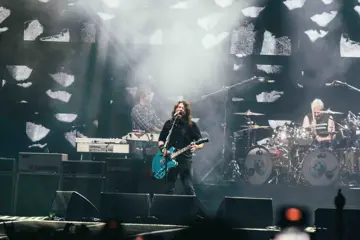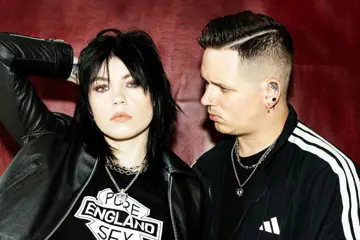Eighteen naked bodies walking. Dancing. Nine men, nine women and a pulsing, hypnotic score. Welcome to the primal yet philosophical world of French choreographer Olivier Dubois. Welcome to Tragedie.
When it debuted at the Festival D'Avignon in 2012, Tragedie created an incredible buzz around Dubois and his edgy, minimalist style. Four years later and it has finally made it to our shores, landing at Carriageworks for a two-night stint in early September. But be warned: it will be brutal.
"I love monsters," Dubois declares. "I love the metamorphosis of our bodies and that's what I always search for. The poetic monster."
"It's important to say that Tragedie is a choreographic poem and so has its rhetorical rules in the chorus in ancient Greek tragedy."
In keeping with the energy and raw physical power that Dubois endeavours to convey, the work deviates from the highly intellectual mainstream of contemporary dance. "Hopefully I stay away from the bourgeois or civilised," he says. "Away from the pretending 'intellectual' dance world; because art and 'intellectual' cannot match. Intelligence for sure, even intelligence of the sensation, but having an idea is not enough. Building a vision is something else. And I love it when dance is dancing, so let's stay wild."
That said, Tragedie does have some of its conceptual roots in both high culture and philosophy, most notably Greek tragedy and Friedrich Nietzsche's 1872 work The Birth Of Tragedy. As Dubois reveals, "It was one of the dozens of books I read during my preparation. Nietzsche, de Beauvoir, Loraux, Heidegger, gender studies. I read them as a space of dialogue, contestation or confirmation, but never as a reference or a path to follow... It's important to say that Tragedie is a choreographic poem and so has its rhetorical rules in the chorus in ancient Greek tragedy."
Don't miss a beat with our FREE daily newsletter
Then again, with its nudity and walking motif, the work points at the deep history of dance which is considered, along with drumming and singing, to be amongst the very first human artforms, requiring nothing more than space, time (rhythm) and form (bodies). Responding to this idea, Olivier Dubois explains, "Tragedie is an attempt to approach a sensation of the world. I cannot show you the humanity but I can allow you to feel your own perception of the world."
Here again, there is a connection to something animal and basic; namely, walking. "Nobody walks in the same way, so nobody will dance the same way," Dubois notes. This he has welded to repetitive movements and a pounding bass, as though to evoke something hypnotic and possibly transcendent. Of the music, he says, "I was with the composer Francois Caffenne searching for a 'trans-historical' sound where you could feel the past running to you and the announcement of a future coming."
Olivier Dubois readily concedes to being obsessive, and as such Tragedie is part of an ongoing creative vision. Indeed, he has just completed a fourth work in the series of which Tragedie is the third. "After the sensation of the world that gives Tragedie," he concludes, "I needed to search for the fate of the world."
But has he found it yet?















